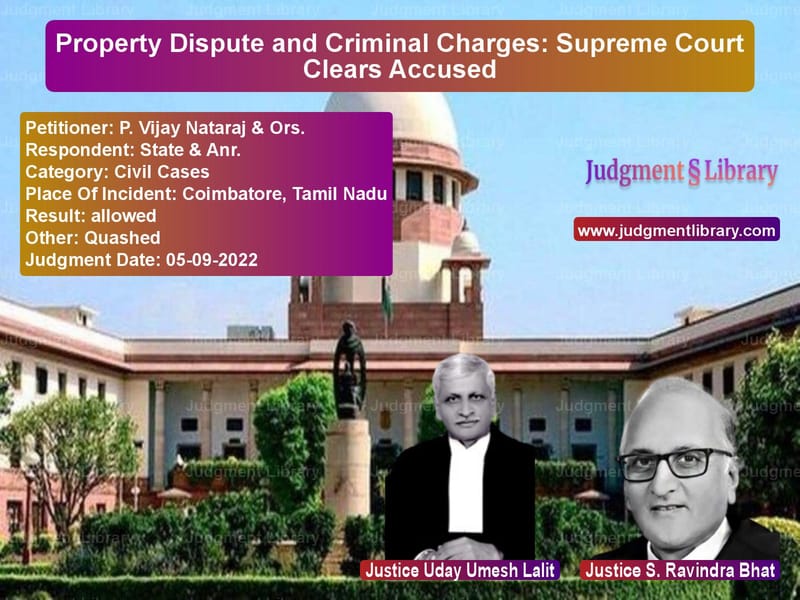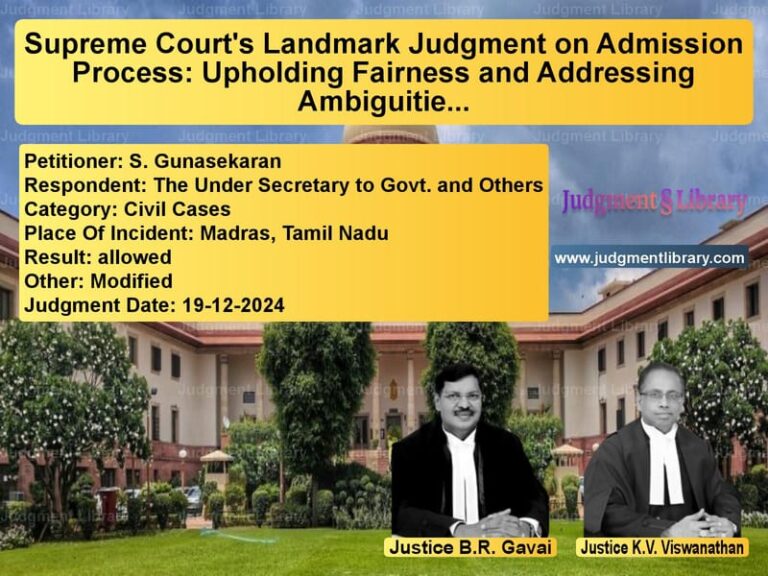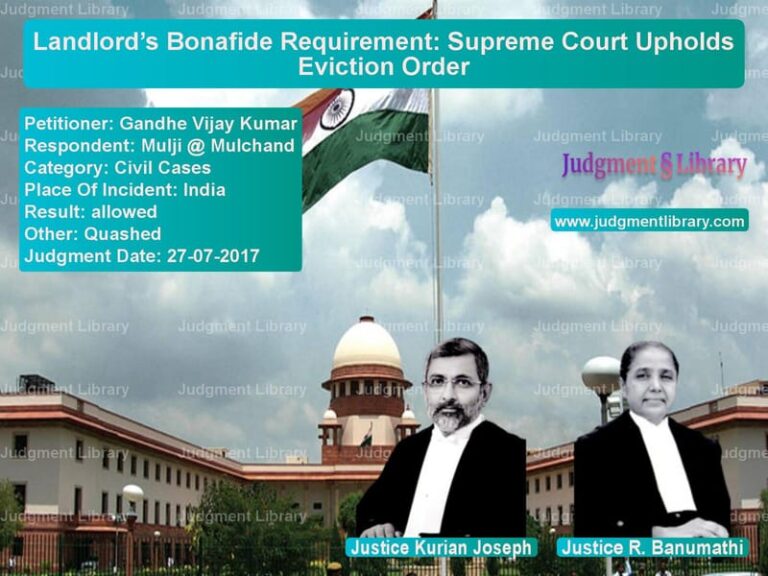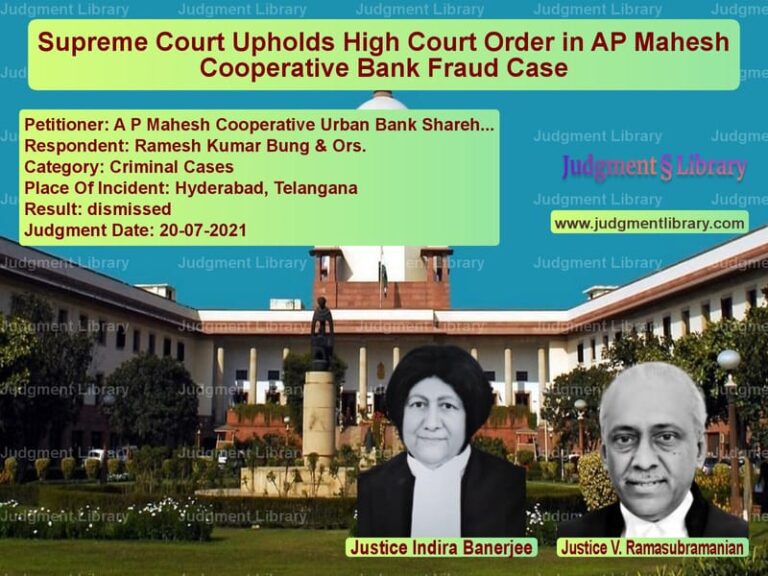Property Dispute and Criminal Charges: Supreme Court Clears Accused
Legal disputes involving property transactions often lead to prolonged litigation, sometimes resulting in criminal charges against sellers. The case of P. Vijay Nataraj & Ors. v. State & Anr. is a significant example where a property transaction resulted in criminal proceedings due to a lack of disclosure regarding land reservations under the Tamil Nadu Town and Country Planning Act, 1971. The Supreme Court ultimately discharged the accused, highlighting key principles in property transactions and criminal liability.
Background of the Case
The dispute arose when the appellants, P. Vijay Nataraj and others, executed two separate sale deeds transferring their interest in a piece of land to the complainant. However, the complainant later discovered that the land was subject to government reservation proceedings under Tamil Nadu’s urban planning laws. The complainant alleged that the sellers failed to disclose this crucial fact, leading to a criminal complaint being registered against the appellants.
Legal Proceedings
The case went through multiple stages of litigation:
- The complainant filed a criminal case (C.C. No. 284 of 2011, later renumbered as C.C. No. 1524 of 2019) before the Judicial Magistrate, Coimbatore.
- The accused (appellants) sought discharge from the case, arguing that they were unaware of the land reservation status and had no intent to deceive.
- The Trial Court rejected their discharge application.
- The accused filed a revision petition before the Principal District & Sessions Judge, Coimbatore, which was also dismissed.
- They then moved the High Court of Madras, which upheld the lower courts’ decisions and refused to grant them relief.
- The appellants subsequently approached the Supreme Court, challenging the High Court’s decision.
Arguments by the Appellants
The appellants contended that:
- They were unaware of the land reservation proceedings when executing the sale deeds.
- The complainant acquired full title to the property and had the right to enjoy it.
- The case did not involve fraudulent intent or criminal conspiracy.
- The matter was purely civil in nature and should not have led to criminal prosecution.
Arguments by the Complainant
The complainant argued that:
- The sellers had a duty to disclose any government restrictions on the property.
- Failure to disclose the reservation status amounted to cheating and misrepresentation.
- Since the land was under government reservation, the complainant suffered financial loss.
- The accused should face criminal liability for their omissions.
Supreme Court’s Observations
The Supreme Court, comprising Chief Justice Uday Umesh Lalit and Justice S. Ravindra Bhat, analyzed the facts and legal position. Key observations made by the Court included:
1. No Evidence of Intent to Cheat
The Court found no evidence that the appellants deliberately withheld information about the land reservation. It noted:
“The appellants never claimed any interest in the land after its conveyance, and the complainant was entitled to enjoy the lands in his capacity as a titleholder.”
2. Prior High Court Order Supporting the Complainant
The Court referenced an earlier Madras High Court ruling (W.P. No. 417 of 2022), which directed that the land should be released from government reservation in favor of the complainant. The Supreme Court noted:
Read also: https://judgmentlibrary.com/supreme-court-denies-transfer-of-civil-case-orders-expedited-trial/
“As has been observed by the High Court, the land would be released in favor of the complainant.”
3. Offer to Return Consideration
The appellants expressed willingness to return the sale consideration if the complainant desired. The Court found this as evidence of their bona fides.
4. Civil Dispute, Not Criminal
The Court reiterated that mere nondisclosure of land reservation does not constitute a criminal offense unless there is deliberate intent to cheat.
Final Judgment
The Supreme Court allowed the appeal and discharged the appellants from all criminal charges. The ruling stated:
“Considering the fact that the appellants never claimed any interest in the land and the fact that their bona fides are clear, the application seeking discharge as filed by the present appellants deserves acceptance.”
The Court further clarified:
“It is declared that they have nothing to do with the land in question and that the land now stands released in favor of the complainant.”
Key Takeaways from the Judgment
This case establishes important principles regarding property transactions and criminal liability:
1. Nondisclosure Does Not Always Amount to Fraud
The ruling confirms that failure to disclose certain facts, such as government reservations, does not automatically make a seller criminally liable unless fraudulent intent is established.
2. Civil Disputes Should Not Be Criminalized
Many property disputes arise due to misunderstandings or lack of due diligence. The Court reinforced that such cases should be resolved through civil proceedings rather than criminal prosecution.
3. Supreme Court’s Preference for Mediation
By acknowledging the appellants’ willingness to return the consideration and emphasizing a High Court order favoring the complainant, the Supreme Court demonstrated its preference for resolving such disputes amicably rather than through lengthy litigation.
4. Importance of Legal Due Diligence in Property Transactions
The case underscores the need for both buyers and sellers to conduct thorough due diligence before executing property transactions.
Conclusion
The Supreme Court’s judgment in P. Vijay Nataraj & Ors. v. State & Anr. is a landmark ruling in property law and criminal jurisprudence. It reinforces the principle that criminal charges should not be used to settle what are essentially civil disputes. The case also highlights the importance of procedural fairness and judicial discretion in protecting individuals from wrongful prosecution.
Petitioner Name: P. Vijay Nataraj & Ors..Respondent Name: State & Anr..Judgment By: Justice Uday Umesh Lalit, Justice S. Ravindra Bhat.Place Of Incident: Coimbatore, Tamil Nadu.Judgment Date: 05-09-2022.
Don’t miss out on the full details! Download the complete judgment in PDF format below and gain valuable insights instantly!
Download Judgment: p.-vijay-nataraj-&-o-vs-state-&-anr.-supreme-court-of-india-judgment-dated-05-09-2022.pdf
Directly Download Judgment: Directly download this Judgment
See all petitions in Property Disputes
See all petitions in Contract Disputes
See all petitions in Judgment by Uday Umesh Lalit
See all petitions in Judgment by S Ravindra Bhat
See all petitions in allowed
See all petitions in Quashed
See all petitions in supreme court of India judgments September 2022
See all petitions in 2022 judgments
See all posts in Civil Cases Category
See all allowed petitions in Civil Cases Category
See all Dismissed petitions in Civil Cases Category
See all partially allowed petitions in Civil Cases Category







